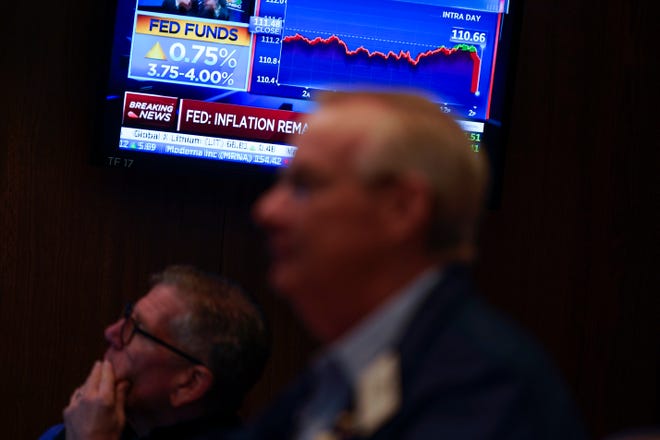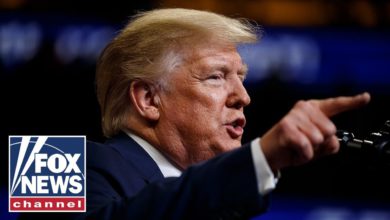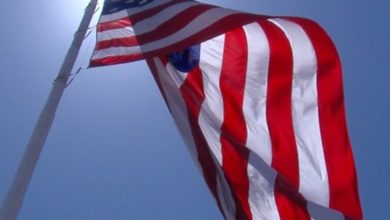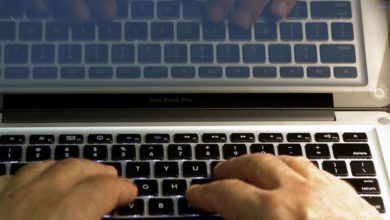
Inflation’s finally cooling, and interest rates may be peaking soon. That means now may be the right time to jump back into the market – even with a potential recession on the horizon, some strategists say.
Forty-year high inflation and the most aggressive interest rate hikes by the Federal Reserve since the 1980s pummeled people’s portfolios last year. Stocks and bonds, which normally move in opposite directions, plunged simultaneously, leaving the classic diversified 60% stock/40% bond, or 60/40, portfolio in shambles and investors with nowhere to hide. Morningstar’s U.S. Moderate Target Allocation Index – designed as the benchmark for a 60/40 allocation portfolio – lost 15.3%, the biggest annual decline since 2008.
But 2023’s on a different trajectory, offering investors hope they can start rebuilding their retirement balances, some say.
“Overall, the inflation pendulum is swinging back now,” said David Russell, vice president of market intelligence at online securities and futures brokerage firm TradeStation. “The bond market sees it, and so does the stock market. That entire 60/40 strategy can go back to work, and I think we’re seeing that happen today. We’re seeing money flowing into bonds and the S&P and Nasdaq, in particular.”
What happened last year?
When inflation surged to a 40-year high, the Fed hiked last year its short-term benchmark fed funds rate by a whopping 425 basis points total, including three consecutive supersized 0.75-point ones, to cool inflation. Higher rates increase the cost of borrowing for people spending and for businesses to invest in future earnings growth, which slows demand, the economy and inflation.
When interest rates jump, bond prices drop because older bonds become less valuable. Their coupon payments are now lower than those of new bonds being offered in the market at higher rates.
The combination of high inflation and aggressive rate hikes set the stage for a rare occurrence: Values of stocks and bonds plunged simultaneously.
“Going back to 1929, there have only been 3 years where bonds didn’t go up when stocks went down,” investment firm BlackRock wrote in a report last year. The last time it happened was 1969, it said.

What if there's a recession?
Maybe it won’t matter.
“There’s so much negative sentiment, it almost feels and seems like recession has already been priced in,” said Peter Essele, Commonwealth Financial Network’s head of portfolio management. “This has been the most over-forecasted recession. I think people are sort of numb.”
Three-quarters of Americans already thought the economy was already in a recession last fall, according to a CNN poll. The fourth-quarter AICPA Business and Industry Economic Outlook Survey showed 51% of business executives said the U.S. economy was either already in recession or would be by the new year.
Because people are already preparing for the worst, Essele says “usually, stocks bottom 60% or so way through a recession, but I think we will -- or already have bottomed – a lot sooner in this one. Recent data also, some economists say, point to a slower economy but possibly, no recession or a shallow one.”
Looking for a bull:Will stocks rally this year after a dismal 2022? Here's what to watch for
Down but not out:Inflation's finally easing. Why that's a good sign for the real estate sector this year
What could this mean for investors in 2023?
If inflation continues to trend lower as it has, the Fed pauses rate hikes as it’s expected to and all the bad news is priced in, it’s time to jump back into the market, some strategists say.
“We have better clarity of where the end game is for rates and inflation,” Essele said, and that’s what matters most. Unpredictability is what roils markets, not so much the level at which the Fed stops raising rates, he said.
Also, if the economy falls into recession, the Fed could start lowering rates in the last part of 2023, which would jumpstart the economy, some strategists say. The CME’s Fed Watch tool, which shows where investors think the fed funds rate will be at each policy meeting of the year, mirrors this view with most expecting a quarter-point rate cut in November.
Worries:In an unusual economy, these financial dangers may be of more concern than a recession
What's in store:Housing market predictions: Six experts weigh in on the real estate outlook in 2023
What might be good investments?
With signs 10-year yields have peaked or are near peak, “we’ll see strength in housing stocks,” Russell said. “Home builders will be very strong. There’s very strong structural demand in the country for housing.”
He also likes steel makers and metals companies that have underperformed but could catch a tailwind from infrastructure projects.
Additionally, “the combination of high home prices and high rates put buyers off last year, but as we see home prices fall, people will be more willing to buy with the hope that they can refinance in the future when rates are lower,” said Jon Klaff, general manager of investment platform Magnifi. A recession, he said, could kick off a drop in home prices.
Bonds are also a good bet, again, for retirement portfolios. “Now that yields are a lot higher, I think bonds have become a lot more attractive,” said Jason Kephart, director of multi-asset ratings for Morningstar Research.
DIY investing:You don't always need to hire a pro. Here's how self-directed investing works
Hedging bets:As rates rise, inflation heats up and stocks plunge, you can still hedge your bets
Don’t forget diversification
Whatever you invest in, diversification is key to weather volatility in case markets move higher in fits and starts or as other strategists believe, the stock market hasn't yet priced in all the bad news and has room to fall.
Morgan Stanley chief U.S. equity strategist Michael Wilson says corporate earnings forecasts are still too low, suggesting a drop in stock prices "for which most are not prepared...the main culprit is the elevated and volatile inflationary environment which is likely to play havoc with profitability."
But this is where the traditional 60/40 portfolio comes in handy, bullish strategists say.
Though the 60/40 portfolio didn’t work well last year, it was an aberration, they say. With higher bond yields this year, bonds can generate income for investors that will help insulate against any stock downturns this year.
“Risk is slowly coming back to normal,” Russell said. “After three years of intense turbulence, we’re returning to equilibrium. It’s not a straight line, but the economy’s returning to normal.”
If you’re still worried, strategists recommend dollar cost averaging. “By making regular investments in the same securities over time, you average out the price you pay for the security,” Klaff said. That ensures you’re taking advantage of market drops and don't have to worry about buying at top prices.
Medora Lee is a money, markets and personal finance reporter at USA TODAY. You can reach her at [email protected] and subscribe to our free Daily Money newsletter for personal finance tips and business news every Monday through Friday morning.
Source link









